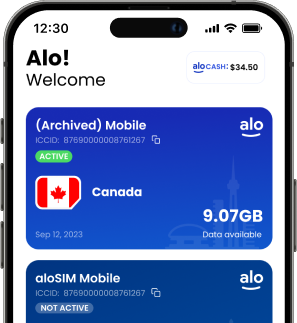How we conduct ourselves with our mobile phones can say a lot about how much we respect other people, and this can be especially true when traveling to other countries.
While it may be perfectly acceptable in North America to have your phone out on the table at a restaurant — and even check your texts, gasp! — it’s still considered pretty obnoxious to take a call in the middle of dinner. (People still do that, though, while other diners sit there in silent judgment.)
Perceptions around phone use do differ around the world, with some places being way more relaxed about it than others. We love to travel here at aloSIM, so we’ve rounded up a few of our best international phone etiquette tips. From how (and when) to check your voicemail to when you should definitely not pick up a call, here are a few suggestions to help avoid any cultural misunderstandings …
Leave a message — or don’t?
It is pretty common these days for younger people the world over to eschew voicemail (and maybe not even pick up their phone when it rings) as we are transitioning to a more texting-based world.
Don’t answer that!
In Japan, you’ll see signs everywhere asking people not to use their mobile phones in public spaces as it is considered rude, and generally the Japanese dislike lengthy mobile phone conversations in the presence of others.
In the U.K., answering your phone while having a face-to-face conversation with somebody is seen as terribly inconsiderate — and the person on the line also expects your full, undivided attention.
But in China and Thailand, not picking up the phone anytime it rings is considered rude, and often callers will just keep calling back until you do pick up.
Check your volume
Being stuck close to a loud mobile phone talker anywhere can be super annoying, but in France it is considered très impoli (very rude) to talk loudly into your phone.
Don’t text and drive
Having your phone in your hand while driving or riding a bike is illegal in many places, so be sure to check the rules before you travel (and maybe consider dropping this dangerous habit altogether).
Keep it snappy, or don’t
Phone calls can be expensive for the person receiving them in some countries, so the person you are calling may not be in the mood for small talk. In some regions, bad reception and spotty service may also lead to a love of short and to-the-point conversations.
However, in many nations, people love to have long conversations with no notion for privacy or what might be sensitive topics. (If you understand the language in Italy or Spain, you could eavesdrop on some very scandalous chit-chat.) In Egypt, getting straight to the point just isn’t the norm, so expect a good five minutes of small talk before getting to the meat of the conversation.
Minimizing the amount of time we spend staring at our phones when traveling is always a good idea, anyway. After all, we travel to discover new things, see the sights, and experience new cultures — and that’s pretty much impossible to do if we’re constantly scrolling through social media and messages. Tuck your phone away and live in the moment, and we promise you’ll get more out of your time away.





